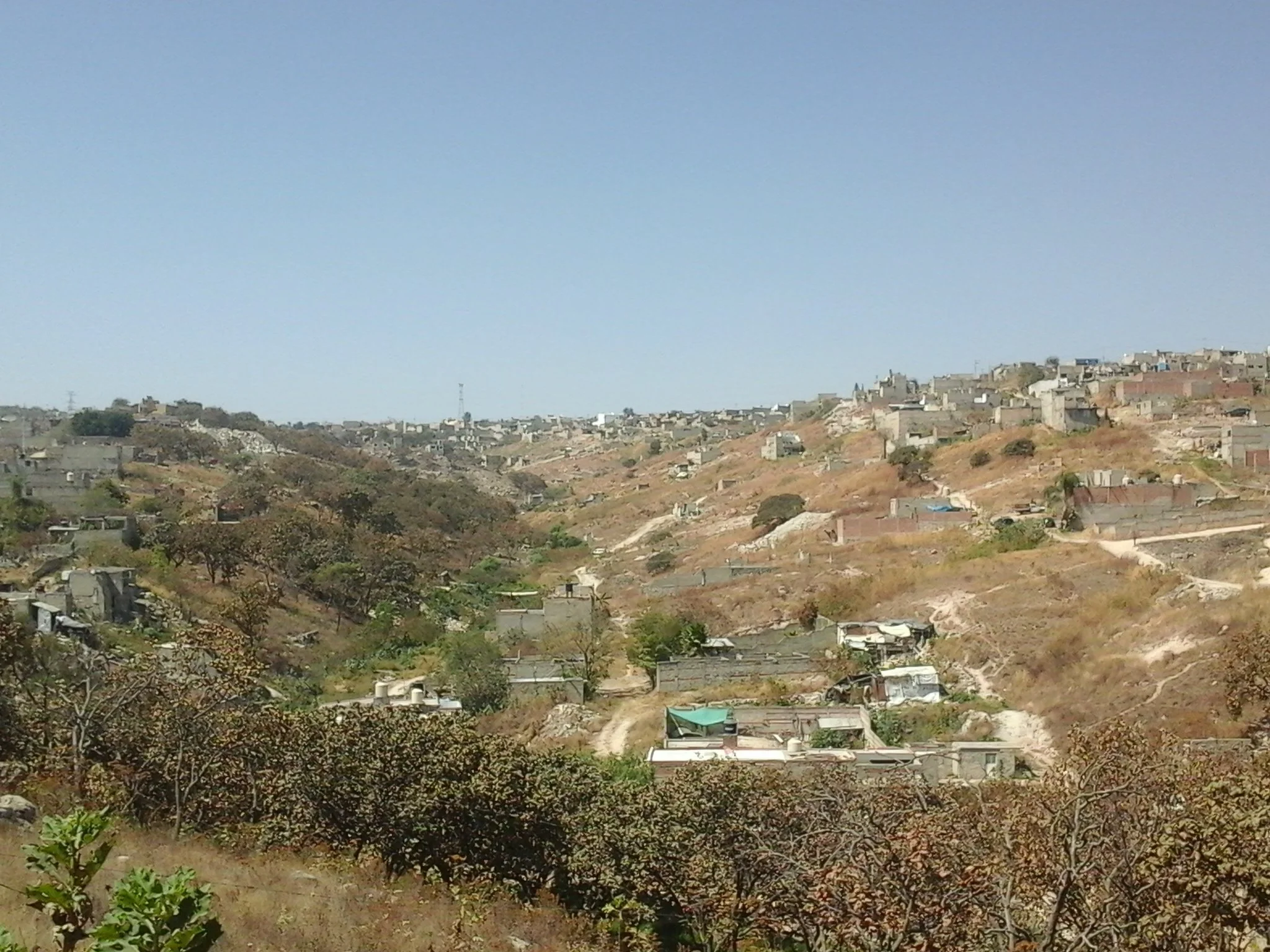Grasping the ‘digitalising state’ in the Global South: Challenges and opportunities of interdisciplinary and transnational research
Mariana Reyes
Observing validation exercises in Kajiado town centres plots. Credit: Dennis Muthama
Over the past ten months, the five post-doctoral researchers affiliated with the Regional Futures project have been dedicated to the exploration of the implications of digital technologies in land governance and territorial politics. Specifically, our team has delved into the transformative effects of GIS software, remote sensing tools, and other digital innovations on how land is accessed, controlled, and marketed within three major metropolitan regions in the Global South: Mumbai (India), Guadalajara (Mexico), and Nairobi (Kenya). To unravel these complex dynamics, we have employed a diverse set of qualitative research methods, including ethnographic observations, archival research, and in-depth interviews with both state and non-state actors.
The geographical diversity of our team, spanning Mumbai, Guadalajara, Nairobi, and London has spurred a continuous process of remote communication. This collaborative approach has not only enriched our interdisciplinary and transnational research but has also paved the way for a deeper understanding of state structures and performances in the digital age. In the following paragraphs, I will outline some of our key insights, emphasising how collaborative, transnational inquiries shed light on the interplay between digitalisation and urbanisation (see Datta, 2023). My aims is for these reflections to be valuable to fellow Early Career Researchers working at the intersection of human geography, urban studies, and science and technology studies. Furthermore, I hope our ideas will contribute to the ongoing discussion about how to progress towards academic research that is critical, anti-colonial, and emancipatory (Bhambra et al., 2018; Cupples & Grosfoguel, 2018; Davies, 2023; Jazeel, 2017; Tuhiwai Smith, 2013).
One of the most prominent challenges we have faced in our research is locating the physical spaces where the state takes shape. While many bureaucratic processes unfold in governmental offices and agencies such as urban planning departments, local cadastres, and municipal headquarters, numerous state and para-state actors operate in less discernible locations. As a result, our inquiry into the relationship between digital technologies and land management policies has necessitated immersion in spaces and places that extend beyond traditional bureaucratic settings. A compelling example of this is our team’s ethnographic observations of actors and organisations operating on the outskirts of Nairobi. Specifically, team members have shadowed land administration officials into the emerging town centres/rural lands of Kajiado County, situated on the periphery of Nairobi, where we have witnessed a state-led process of land validation and conflict resolution (see Figure 1). Similarly, our team members in Mexico have closely monitored the influence of Information and Communication Technologies (ICTs) on communally owned lands, known as ejidos and comunidades agrarias (see Figure 2). These engagements have provoked profound reflections on the geographies where state -led digitalisation unfolds, which often do not align with conventional government sites.
Comunidad indigena ‘Mezquitán’ in Mexico. Credit: Fenna Hoefsloot
The intensive fieldwork conducted in recent months has also spurred us to engage in a thorough reflection on our positionalities and the contexts in which we work. We have critically examined our racial, gender, class and religious identities and how they influence our research methods and knowledge production. As part of this process, we have contemplated our intersecting positionalities while consistently acknowledging the ways in which power and identity manifest in the ‘field’. An essential aspect of this scrutiny has been our examination of gender dynamics in the spaces where we conduct research (see Figure 3). Importantly, our female team members have reflected on state institutions as male-dominated spaces, where our presence is sometimes met with patronising attitudes or even sexist behaviours.
Our experiences with sexism and misogyny are not isolated incidents but rather reflections of broader gender inequalities in society. As a growing body of feminist and decolonial literature underscores, gender plays a pivotal role in knowledge production and dissemination processes (e.g., Haraway, 1988; Momsen, 1993; Nast, 1994; Rose, 1997; Townsend & De Corcuera, 1993; Zaragocin & Caretta, 2021). Furthermore, we have learned from numerous female and non-binary scholars about research contexts where individuals coded as female face distrust, surveillance, management, and harassment (e.g., Ahmed, 2023; Calderon, 2014; Nast, 1994; Tolia‐Kelly, 2017). Most importantly, this journey has enabled us to discover pragmatic ways to navigate sexism, misogyny, and homophobia in the short term while contributing to the development of methodologies that empower female and non-binary researchers in the long term.
Researching male-dominated spaces in Bhiwandi, India. Credit: Neha Gupta.
Lastly, the past ten months have provided us with an opportunity to contemplate the intricacies of conducting research on the digitalising state within a global context. We have first-hand experience of the challenges associated with working as a transnational and multidisciplinary team. These challenges range from managing different time zones to integrating perspectives from an interdisciplinary and culturally diverse team. Our diverse academic backgrounds have significantly influenced our research methods and our understanding of the intersection between digital infrastructures and state practices. In light of this diversity, we have embraced various theoretical approaches and critically examined fundamental concepts (e.g., land, space, territory, place, the Global South) from diverse disciplinary perspectives and academic traditions.
In summary, the past months of research under the Regional Futures project have generated a series of reflections and lessons on how to approach bureaucratic institutions and state actors more effectively. During this time, we have not only made substantial progress in comprehending the local contexts in which we are embedded but have also gained deeper insights into the gender, racial, and class dimensions of our research practice. As a result, we have endeavoured to adopt approaches that fully recognise the utility of employing multiple methods when investigating different facets of the same issue. Importantly, our journey has enhanced our perception of research as a process inherently shaped by a complex web of political, contextual, spatial, and temporal relations, rather than a value-neutral endeavour. In conclusion, we hope that this brief blog entry, along with the future discussions within the project, will contribute to the ongoing conversation about advancing academic research that approaches state spaces from critical, interdisciplinary, and feminist perspectives.
References
Ahmed, S. (2023). The Feminist Killjoy Handbook. Allen Lane.
Bhambra, G. K., Gebrial, D., & Nişancıoğlu, K. (Eds.). (2018). Decolonising the University. Pluto Press.
Calderon, D. (2014). Anticolonial methodologies in education: Embodying land and indigeneity in Chicana feminisms. Journal of Latino/Latin American Studies, 6(2), 81–96.
Cupples, J., & Grosfoguel, R. (2018). Unsettling Eurocentrism in the Westernized University. Routledge.
Datta, A. (2023). The digitalising state: Governing digitalisation-as-urbanisation in the global south. In Progress in Human Geography (Vol. 47, Issue 1, pp. 141–159).
Davies, A. (2023). Of elephants and discipline: For a recursive history of geography. Dialogues in Human Geography, 20438206231177064.
Haraway, D. (1988). Situated Knowledges: The science question in feminism and the privilege of partial perspective. Feminist Studies, 14(3), 575–599. https://doi.org/10.2307/3178066
Jazeel, T. (2017). Mainstreaming geography’s decolonial imperative. Transactions of the Institute of British Geographers, 42(3), 334–337.
Momsen, J. (1993). Gender and restructuring. Introduction. Geoforum, 24(1), 1–3.
Nast, H. J. (1994). Women in the field: Critical feminist methodologies and theoretical perspectives: Opening remarks on “women in the field”. The Professional Geographer, 46(1), 54–66.
Rose, G. (1997). Situating knowledges: Positionality, reflexivities and other tactics. Progress in Human Geography, 21(3), 305–320.
Tolia‐Kelly, D. P. (2017). A day in the life of a Geographer:‘lone’1, black, female. Area, 49(3), 324–328.
Townsend, J. G., & De Corcuera, J. B. (1993). Feminists in the rainforest in Mexico. Geoforum, 24(1), 45–54.
Tuhiwai Smith, L. (2013). Decolonizing Methodologies: Research and Indigenous Peoples. Zed Books.
Zaragocin, S., & Caretta, M. A. (2021). Cuerpo-Territorio: A decolonial feminist geographical method for the study of embodiment. Annals of the American Association of Geographers, 111(5), 1503–1518. https://doi.org/10.1080/24694452.2020.1812370



